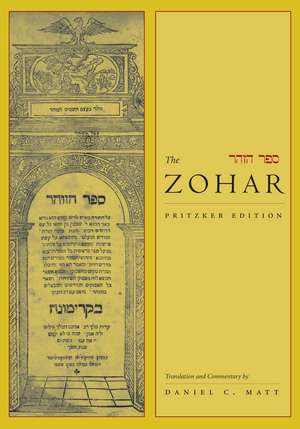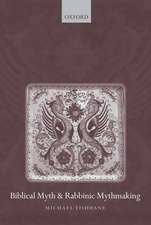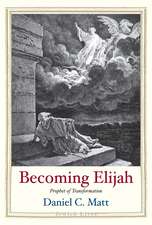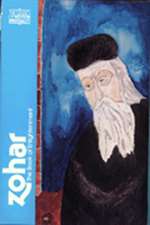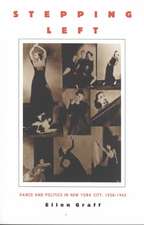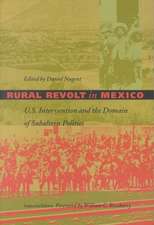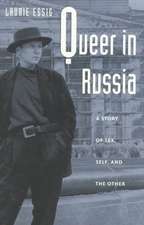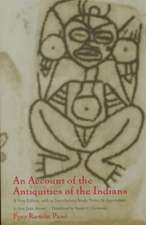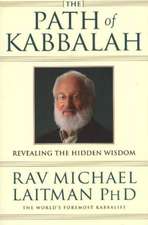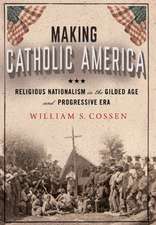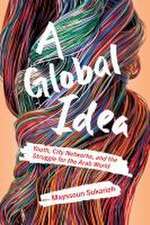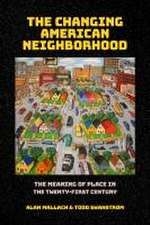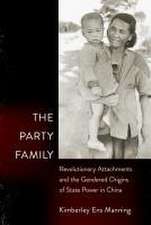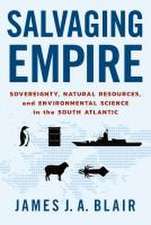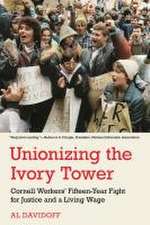The Zohar: Pritzker Edition, Volume Seven: The Zohar: Pritzker Edition, cartea 7
Traducere de Daniel Matten Limba Engleză Hardback – 13 noi 2012
Sefer ha-Zohar (The Book of Radiance) has amazed readers ever since it emerged in medieval Spain over seven hundred years ago. Written in lyrical Aramaic, this masterpiece of Kabbalah exceeds the dimensions of a normal book; it is virtually a body of mystical literature, comprising over twenty discrete sections. The bulk of the Zohar consists of a mystical interpretation of the Torah, from Genesis through Deuteronomy.
This seventh volume of The Zohar: Pritzker Edition consists of commentary on more than half the book of Leviticus. How does the Zohar deal with a biblical text devoted largely to animal sacrifices, cereal offerings, and priestly ritual? Here these ancient laws and procedures are spiritualized, transformed into symbols of God's inner life, now that both the Desert Tabernacle and the Temple in Jerusalem no longer exist. For example, the ascent offering, which was totally consumed on the altar, is known in Hebrew as olah (literally, "that which ascends"). In the Zohar, this symbolizes Shekhinah, last of the ten sefirot (divine potencies), who ascends to unite with Her beloved, the blessed Holy One.
The biblical narrative describes how two of Aaron's sons, Nadab and Abihu, offered alien fire before YHVH and were immediately consumed in a divine blaze. Rabbinic tradition suggested various reasons why they were killed: they lacked the proper priestly garments, or had not washed their hands and feet, or were drunk, or were not married. For the Zohar, marriage enables one to imitate the divine union of male and female energies, and to stimulate that union above. By not marrying, Nadab and Abihu remained incomplete and unfulfilled. According to a related Zoharic passage, their ritual act failed because in their contemplation of the divine qualities they did not include Shekhinah. Without Her, God is incomplete.
This seventh volume of The Zohar: Pritzker Edition consists of commentary on more than half the book of Leviticus. How does the Zohar deal with a biblical text devoted largely to animal sacrifices, cereal offerings, and priestly ritual? Here these ancient laws and procedures are spiritualized, transformed into symbols of God's inner life, now that both the Desert Tabernacle and the Temple in Jerusalem no longer exist. For example, the ascent offering, which was totally consumed on the altar, is known in Hebrew as olah (literally, "that which ascends"). In the Zohar, this symbolizes Shekhinah, last of the ten sefirot (divine potencies), who ascends to unite with Her beloved, the blessed Holy One.
The biblical narrative describes how two of Aaron's sons, Nadab and Abihu, offered alien fire before YHVH and were immediately consumed in a divine blaze. Rabbinic tradition suggested various reasons why they were killed: they lacked the proper priestly garments, or had not washed their hands and feet, or were drunk, or were not married. For the Zohar, marriage enables one to imitate the divine union of male and female energies, and to stimulate that union above. By not marrying, Nadab and Abihu remained incomplete and unfulfilled. According to a related Zoharic passage, their ritual act failed because in their contemplation of the divine qualities they did not include Shekhinah. Without Her, God is incomplete.
| Toate formatele și edițiile | Preț | Express |
|---|---|---|
| Hardback (8) | 384.95 lei 3-5 săpt. | |
| Stanford University Press – 17 apr 2023 | 384.95 lei 3-5 săpt. | |
| Stanford University Press – 4 oct 2011 | 384.95 lei 3-5 săpt. | |
| Stanford University Press – 27 oct 2003 | 391.30 lei 3-5 săpt. | +50.00 lei 7-13 zile |
| Stanford University Press – 27 sep 2007 | 393.29 lei 3-5 săpt. | |
| Stanford University Press – 13 noi 2012 | 393.54 lei 3-5 săpt. | |
| Stanford University Press – 4 dec 2005 | 394.16 lei 3-5 săpt. | +160.68 lei 7-13 zile |
| Stanford University Press – 18 mar 2014 | 394.59 lei 3-5 săpt. | |
| Stanford University Press – 20 oct 2009 | 397.07 lei 3-5 săpt. | +53.31 lei 7-13 zile |
Preț: 393.54 lei
Nou
Puncte Express: 590
Preț estimativ în valută:
75.30€ • 78.62$ • 62.32£
75.30€ • 78.62$ • 62.32£
Carte disponibilă
Livrare economică 14-28 martie
Preluare comenzi: 021 569.72.76
Specificații
ISBN-13: 9780804783057
ISBN-10: 0804783055
Pagini: 608
Dimensiuni: 178 x 254 x 43 mm
Greutate: 1.23 kg
Ediția:New.
Editura: Stanford University Press
Colecția Stanford University Press
Seria The Zohar: Pritzker Edition
ISBN-10: 0804783055
Pagini: 608
Dimensiuni: 178 x 254 x 43 mm
Greutate: 1.23 kg
Ediția:New.
Editura: Stanford University Press
Colecția Stanford University Press
Seria The Zohar: Pritzker Edition
Recenzii
"A monumental contribution to the history of Jewish thought." —Koret Jewish Book Award, The Zohar: Pritzker Edition, Volumes I and II
"Daniel Matt's work is superior to any other available translation of the Zohar because of its superb poetic language, the exegetical contribution of its copious notes, and its superior underlying Aramaic text, which was specially prepared by Dr. Matt from numerous original Zohar manuscripts."—Moshe Idel, Max Cooper Professor of Jewish Thought, Hebrew University of Jerusalem
"A superbly fashioned translation and commentary that opens up the Zohar to the English-speaking world. The lucidity and overwhelming relevance of Matt's Zohar will provide both common and uncommon readers with access to a work capable of changing the consciousness of those who enter it."—Harold Bloom, Max Sterling Professor of Humanities, Yale University
"A powerfully poetic rendition of this spiritual masterpiece . . . Matt's new Zohar is a classic already in its first two volumes. The edition alone, or the translation alone, or the commentary alone would be a major contribution. The whole is a work of art."—Journal of the American Academy of Religion
"Daniel Matt's new translation of the Zohar . . . will quickly become the definitive and unrivaled English edition of one of the pre-eminent classics of world mystical literature."—The Jerusalem Report
Notă biografică
Daniel C. Matt is a leading authority on Jewish mysticism. For twenty years, he served as Professor at the Graduate Theological Union in Berkeley, California. He has also taught at Stanford University and the Hebrew University of Jerusalem. Matt is the author of The Essential Kabbalah (1995); God and the Big Bang (1996); and Zohar: Annotated and Explained (2002). He is also the translator of the first six volumes of The Zohar: Pritzker Edition.
Textul de pe ultima copertă
“[Matt’s] text is the most authoritative English translation and the only English edition that goes directly to the source, unearthing many of the major surviving manuscripts of the original language.”—Library Journal
“Daniel Matt’s translation of, and commentary to, the Zohar is a powerfully poetic rendition of this spiritual masterpiece. It is a book to be studied, not read. As one who has pondered and taught the Zohar for many years, I found Matt’s interpretation learned, insightful, and very beautiful. Often, his translation and commentary changed my understanding of passages I thought I had already mastered.”—David R. Blumenthal, Journal of the American Academy of Religion
“Daniel Matt’s translation of, and commentary to, the Zohar is a powerfully poetic rendition of this spiritual masterpiece. It is a book to be studied, not read. As one who has pondered and taught the Zohar for many years, I found Matt’s interpretation learned, insightful, and very beautiful. Often, his translation and commentary changed my understanding of passages I thought I had already mastered.”—David R. Blumenthal, Journal of the American Academy of Religion
Descriere
Descriere de la o altă ediție sau format:
This third volume of The Zohar: Pritzker Edition completes the Zohar's commentary on the book of Genesis. Here we find spiritual explorations of numerous biblical narratives, including Jacob's wrestling with the angel, Joseph's kidnapping by his brothers, his near seduction by Potiphar's wife, his interpretation of Pharaoh's dreams, and his reunion with his brothers and father.
Throughout, the Zohar probes the biblical text and seeks deeper meaning—for example, the divine intention behind Joseph's disappearance, or the profound significance of human sexuality. Divine and human realities intertwine, affecting one another.
Toward the end of Genesis, the Bible states: Jacob's days drew near to die—an idiomatic expression that the Zohar insists on reading hyperliterally. Each human being is challenged to live his days virtuously. If he does, those days themselves are woven into a garment of splendor; at death, they "draw near," enveloping him, escorting him to the beyond.
Sefer ha-Zohar (The Book of Radiance) has amazed and overwhelmed readers ever since it emerged mysteriously in medieval Spain toward the end of the thirteenth century. Written in a unique Aramaic, this masterpiece of Kabbalah exceeds the dimensions of a normal book; it is virtually a body of literature, comprising over twenty discrete sections. The bulk of the Zohar consists of a running commentary on the Torah, from Genesis through Deuteronomy.
Throughout, the Zohar probes the biblical text and seeks deeper meaning—for example, the divine intention behind Joseph's disappearance, or the profound significance of human sexuality. Divine and human realities intertwine, affecting one another.
Toward the end of Genesis, the Bible states: Jacob's days drew near to die—an idiomatic expression that the Zohar insists on reading hyperliterally. Each human being is challenged to live his days virtuously. If he does, those days themselves are woven into a garment of splendor; at death, they "draw near," enveloping him, escorting him to the beyond.
Sefer ha-Zohar (The Book of Radiance) has amazed and overwhelmed readers ever since it emerged mysteriously in medieval Spain toward the end of the thirteenth century. Written in a unique Aramaic, this masterpiece of Kabbalah exceeds the dimensions of a normal book; it is virtually a body of literature, comprising over twenty discrete sections. The bulk of the Zohar consists of a running commentary on the Torah, from Genesis through Deuteronomy.
